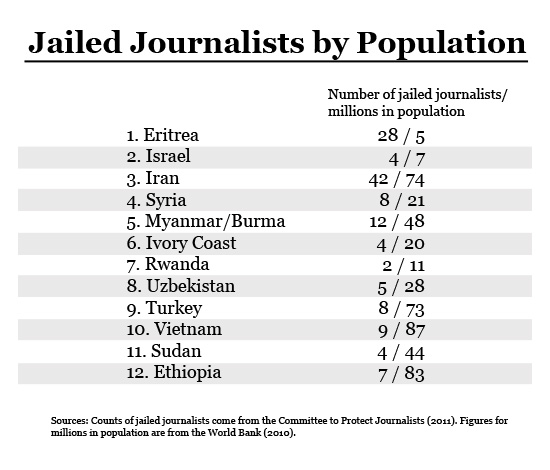At the end of each year, the Committee to Protect Journalists counts the number of journalists imprisoned worldwide and lists the countries in which they’re locked up.
These data are very helpful, but I think we can consider them under a new lamp by taking into account each country’s size. China and Eritrea, for example, have about the same number of journalists rotting in prison, 27 and 28 respectively. But the population of China is over 250 times that of the small dictatorship.
Any country that unjustly arrests or imprisons a single journalist is democratically suspect, of course, and that includes you, America. Ratings of press freedom in the United States tanked after 2011, as counts of arrested journalists in this country soared. Still, though police in the United States tend to arrest journalists filming or otherwise documenting unrest, their bosses usually get embarrassed at the media blowback and drop the charges. Imprisoning journalists for months or years at a time is another matter and, other than the outright murder of journalists in places like Russia and Syria, the long-term jailing of reporters is the offense with which the Committee to Protect Journalists (CPJ) is most concerned.
For a new take on this scourge, I quickly calculated the highest twelve ratios of jailed journalists to a country’s population size.

By far the country that jails the most journalists per capita is Eritrea; Israel is a distant second. The CPJ report was quick to list Iran as the world’s premier jailor of journalists, and the Islamic Republic is up there, but clearly Eritrea and Israel also need to do some explaining. Israel jails more journalists than either the Palestinian Authority (zero) or militant group Hamas (three), both of which it criticizes for human rights miscarriages. Although Syria comes in third, I should note that the country’s government has murdered and detained a number of newspersons since CPJ’s annual counts were issued in December.
Other regimes on the list—communist Vietnam, genocide-guilty Sudan, and Ethiopia’s obtuse oppressors (who, in a country highly dependent on tourism, are stowing two European journalists in a rathole on 11-year sentences—are unlikely to care whether civilized countries disapprove of jailing journalists. Eritrea attracts few tourists that it otherwise might need to satisfy with a better human rights record, and the regime has done little more than yawn at outsiders’ objections to its brutality.
Israel, though, wants to be called a modern democracy and gets cranky when critics point out that it is not. Turkey, too, is a country that has responded to external pressure about its human rights record. Noting that these nations imprison more journalists for their size than Yemen and Iran is a powerful statement. Rwanda and Myanmar have recently attempted to repair their images and become more politically modern nations, but imprisoning journalists is not the mark of progress.
Calculating jailed reporters per capita doesn’t acquit large countries that incarcerate comparatively fewer reporters, of course. We should be thankful that China’s propensity to lock journalists up is less imposing than its size, but the People’s Republic is still one of the world’s worst places for free speech. And India loves being called the world’s largest democracy, but two journalists in prison, even among 1.2 billion people, is two too many (India also locked up hundreds of Tibetans during a recent visit by China’s president, lest they speak openly about Chinese brutality during an important political summit).
Just as we base many national measures on a country’s population—GDP per capita, infant mortality—it may be useful to consider data of the sort listed above. A ratio of a country’s jailed, killed, or exiled journalists to population size can shed light on how aggressively that government targets and disposes of reporters.
Justin D. Martin is a journalism professor at Northwestern University in Qatar. Follow him on Twitter: @Justin_D_Martin
